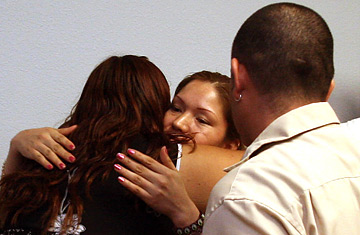
Elvira Arellano receives a hug in Los Angeles, Sunday, Aug. 19, 2007.
Elvira Arellano, like many other advocates for immigration reform, must have been frustrated. There hadn't been a hint of Congressional action on comprehensive immigration reform since the Senate compromise collapsed in late spring. In early August, the Bush Administration moved unilaterally to stiffen enforcement, with Department of Homeland Security head Michael Chertoff announcing more fines and penalties for employers who knowingly hire illegals as well as an increased border crackdown.
So Arellano, an undocumented immigrant who had spent a year holed up at Chicago's Adalberto United Methodist Church while defying a deportation order, made a risky move: she emerged from the storefront church, drove from Chicago to Los Angeles, and gave a series of very public speeches over the weekend. By Monday, the 32-year-old single mother was in Tijuana, having been arrested and deported in one fell swoop.
The news buoyed opponents of illegal immigration, who have long had Arellano in their sights. There had been rumors of citizens' arrests or other Minutemen-style interventions once word spread that Arellano was planning to leave her sanctuary, where the feds typically will not try to arrest illegal immigrants. But the fact that the normally supine federal government did the job for them made the news even sweeter. "Elvira felt entitled to special treatment," says Bob Dane, press secretary of the Federation for American Immigration Reform, which favors tougher border security and enforcement. "She had a mistaken impression that the U.S., unlike any other country on the planet, isn't interested in enforcing its immigration laws."
But Arellano was not just another person facing deportation, and her personal setback may not turn out to be the harbinger of victory that activists like Dane hope it to be. She was the pro-immigrant caucus's poster alien, their best chance to highlight the cruelty of the current status quo. Her deportation will effectively separate her from her American-born son, Saul, 8, at least temporarily. While his mother was living at the church, it was Saul who represented her case at rallies and events around the country, and he is now in the care of the Chicago church's pastor and his wife. Arellano's allies hope that the story of the family's separation will put a face on the millions facing deportation.
"Sometimes a moment that could be discouraging can become an inspiration," says Rev. Alexia Salvatierra, a leading figure in the sanctuary movement. "[Her deportation] will inspire other people."
Salvatierra is right that a one-sided approach to immigration — enforcement alone — will most likely fail. But it will fail for economic, as much as moral, reasons. Agriculture and service sectors still rely too much on hardworking immigrants, regardless of their legal status. Even the whispers of a crackdown have stirred fear in the restaurant industry and added to the angst of farmers, who have steadily reported labor shortages throughout the summer. And the lure for workers to come here is as strong as ever. A Pew Hispanic Center study released today shows Latino immigrants, legal and illegal, have made progress in the wage race: the proportion of foreign-born Latinos in the lowest fifth of all earners declined from 1995-2005 from 42% to 36%. And many workers rose up into the middle brackets.
With both supply and demand for illegal workers still going strong, this Administration will have a difficult time carrying out any wide-scale crackdown, even if the country were prepared to stomach many more family separations like Arellano's (Pew estimates that 3.1 million U.S. citizen children live in a household in which either the head of the family or their spouse is here illegally).
Not that Arellano herself is the ideal figure to rally around. Yes, her son was born here and therefore is an U.S. citizen. But Arellano had already been deported once, years before she ever had a child (she snuck back in after her first deportation a decade ago). Arellano's ambitions to work illegally in the U.S. predate her status as a fugitive mother who only wants to be with her citizen son. Her case and her cause have also at times been handled inartfully — the aggressive use of her young son as a mascot for the movement at times bordered on being exploitative. And finally, as opponents of Arellano rightly point out, she could always simply get Saul to come live with her in Mexico.
For now, Arellano will continue to work for immigration rights from the southern side of the border, and to fight for a private bill in the U.S. Congress that would give her a special permission to return to the States. In the meantime, she and her allies are hoping she'll become a symbol for all those facing deportation. "The blood of the martyrs," says Rev. Salvatierra, quoting old scripture somewhat extravagantly, "is the seed of the church."
